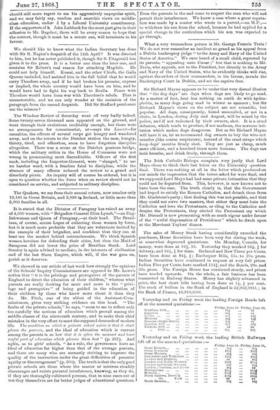We showed in our article of last week how strongly
the opinions -of the Schools' Inquiry Commissioners are opposed to Mr. Lowe's -notion that " it is the privilege and prerogative of the parents of England to direct the education of their children," whereas what -parents are really desiring far more and more is the "privi- lege and prerogative " of being guided in the education of -their children by those who know more about it than they do. Mr. Fitch, one of the ablest of the Assistant-Com- missioners, gives very striking evidence on this head. " The faults of the private schools," he says, " seem to me to reflect only too carefully the notions of education which prevail among the middle classes of the nineteenth century, and to make their chief mistakes in the very effort to meet the supposed demands of modern life. The condition on which a private school exists is that it shall please the parents, and the ideal of education which is current among the parents is so low that it is often the meanest and least stseful part of education which pleases them best" (p. 267). And again, as to girls' schools, "As a rule, the governesses have an ideal of education far higher than that of the average parents, and there are many who are earnestly striving to improve the quality of the instruction under the great difficulties of parental apathy or discouragement" (p. 300). The truth is that the onlygood private schools are those where the master or mistress steadily discourages and resists parental interference, knowing, as they do, if they are thoroughly cultivated persons, that in nine cases out of ten they themselves are far better judges of educational questions. Even the parents in the end come to respect the man who will not permit their interference. We know a case where a great reputa- tion was made by a master who wrote to a parent,—an M.P.,- to withdraw his son from the school, because he had applied for a special change in the curriculum which his son was expected to go through.






























 Previous page
Previous page